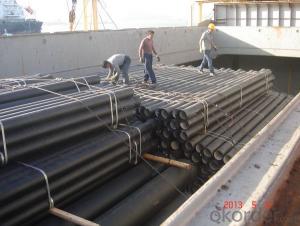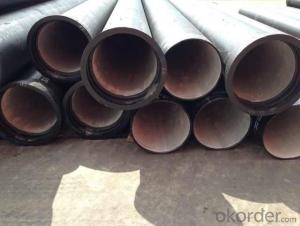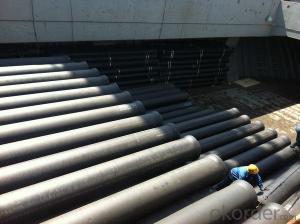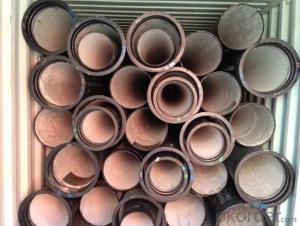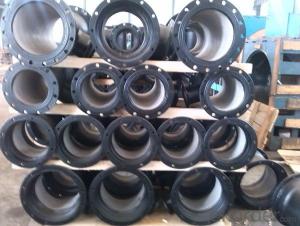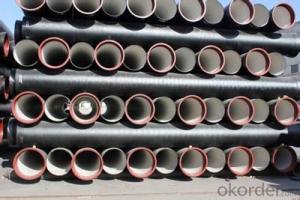DUCTILE IRON PIPE DN 700 K10
- Loading Port:
- Tianjin
- Payment Terms:
- TT OR LC
- Min Order Qty:
- -
- Supply Capability:
- 30000Tons m/month
OKorder Service Pledge
OKorder Financial Service
You Might Also Like
CNBM ductile iron pipe ranges from DN80-DN1600mm (T-Type, Class K9), effective length 6m, comply with ISO2531 Standard
Company Profile
CNBM International Corporation is the leading production base and renowned supplier of Ductile Iron Water Pipe systems of both potable and waste water in China. We are constantly looking to develop high quality products to ensure the longest service life and wonderful performance.
CNBM Pipelines regard quality as the essential factor leading to successful business. Every pipe is tested in accordance with BS EN545 (water application) or BS EN598 (sewer application). CNBM Pipelines products comply with and are tested according to the relevant European and International Standards. Our pipes are manufactured under the quality management system BS EN ISO 9001. After years of efforts, CNBM Pipelines has built up great reputation in terms of quality and service among customers worldwide
Product Introduction
CNBM ductile iron pipe ranges from DN80-DN1600mm (Tyton, T-Type, Class K7/K8/K9), effective length: 6m, complying with BS EN545/EN598/ISO2531/BS4772.
Specification& Payment terms
Internal lining: Pipes shall have an internal cement mortar lining in acc with ISO4179.
External coating: Pipes shall be externally coated with metallic zinc spray plus a further layer of resin painting to ISO8179.
Gasket: 100% SBR/NBR/EPDM gasket in accordance with ISO4633.
Packing: Pipes from DN100 to DN300 be bundled with steel belts, the others are in bulk.
Payment term: By 30% T/T advance payment + 70% Irrevocable L/C at sight.
Packing: In bulk vessel or in container.
- Q: What is the lifespan of ductile iron pipes?
- The lifespan of ductile iron pipes can vary depending on various factors such as the quality of the pipes, the environment they are installed in, and the level of maintenance they receive. However, on average, ductile iron pipes have a lifespan of approximately 80-100 years.
- Q: What is the expected noise reduction of ductile iron pipes?
- Several factors can influence the expected noise reduction of ductile iron pipes. These factors include the characteristics of the pipe material and design, the installation method, and the surrounding environment. Generally, ductile iron pipes have been found to offer significant noise reduction compared to other pipe materials. Ductile iron pipes are renowned for their superior acoustic performance, thanks to their dense and robust construction. The material's high density helps absorb and dampen noise vibrations, thus reducing the transmission of sound waves through the pipe. Furthermore, the smooth internal surface of ductile iron pipes minimizes turbulence and friction, contributing further to noise reduction. Numerous studies and field tests have demonstrated that ductile iron pipes can achieve noise reductions ranging from 10 to 20 decibels (dB) or even higher, depending on specific conditions. These noise reductions can greatly enhance the acoustic environment in areas where the pipes are used, such as residential areas, hospitals, or schools. It is important to acknowledge that while ductile iron pipes can provide substantial noise reduction, other factors like pipe connections, fittings, and valves can impact the overall acoustic performance. Proper installation techniques, including the utilization of effective seals and dampers, can further enhance noise reduction. In conclusion, ductile iron pipes are expected to offer significant noise reduction benefits due to their dense construction, smooth internal surface, and efficient installation methods. However, it is crucial to consider the specific requirements of each project and consult professionals to determine the anticipated noise reduction levels based on the particular circumstances.
- Q: Are ductile iron pipes suitable for underground storage tanks?
- No, ductile iron pipes are not suitable for underground storage tanks.
- Q: Can ductile iron pipes be used in areas with high groundwater levels?
- Yes, ductile iron pipes can be used in areas with high groundwater levels. Ductile iron pipes are known for their durability and strength, making them suitable for various underground applications, including areas with high water tables. They have a robust construction that can withstand external pressures and corrosive environments, making them an excellent choice for water and wastewater systems in such areas.
- Q: How much is a ductile iron pipe dn400?
- Ductile iron pipe nominal diameter is 80 ~ 2200 mm, compared with grey cast iron, high strength, good toughness, thin wall metal, less dosage, and can withstand high pressure, effective length of 5 meters, 6 meters and 8 meters; according to the different thickness of P, G two. It is the development direction of cast iron pipe.
- Q: What are the different lining materials available for ductile iron pipe?
- There are several different lining materials available for ductile iron pipes. These linings are used to protect the pipe from corrosion and extend its lifespan. Some common lining materials include: 1. Cement Mortar Lining: This lining consists of a layer of cement mortar applied to the interior surface of the pipe. It provides a smooth and durable barrier against corrosion and is commonly used in water and wastewater applications. 2. Polyethylene Encasement: Polyethylene encasement involves wrapping the pipe with a layer of polyethylene film. This lining provides excellent corrosion protection and is often used in aggressive soil conditions. 3. Polyurethane Lining: Polyurethane lining is a spray-applied material that forms a seamless and flexible barrier inside the pipe. It offers superior resistance to chemicals and abrasion, making it suitable for applications involving aggressive fluids. 4. Epoxy Lining: Epoxy lining is a popular choice for lining ductile iron pipes, as it provides excellent resistance to corrosion and chemicals. It is typically applied as a liquid coating that cures to form a smooth and protective layer. 5. Zinc Coating: Zinc coating, also known as galvanizing, involves applying a layer of zinc to the exterior surface of the pipe. This lining provides corrosion resistance and is commonly used in outdoor and exposed applications. These lining materials offer different advantages and are chosen based on the specific needs of the application. Factors such as the type of fluid being transported, environmental conditions, and expected service life are considered when selecting the most suitable lining material for ductile iron pipes.
- Q: Can ductile iron pipe be used for marine applications?
- Yes, ductile iron pipe can be used for marine applications. Ductile iron is a type of cast iron that possesses high strength, durability, and resistance to corrosion. These properties make it suitable for various marine environments, including saltwater applications. Ductile iron pipes are commonly used for marine applications such as seawater intake and outfall systems, offshore oil and gas platforms, submarine pipelines, and marine dredging projects. The corrosion-resistant nature of ductile iron helps protect against the harsh conditions found in marine environments, such as corrosive saltwater, tidal currents, and marine organisms. Additionally, ductile iron pipes are known for their excellent mechanical properties, including high tensile strength and impact resistance, which further enhance their suitability for marine applications. Overall, ductile iron pipe is a reliable and cost-effective choice for various marine applications.
- Q: What are the advantages of using ductile iron pipes over other materials?
- Using ductile iron pipes instead of other materials offers several advantages. To begin with, ductile iron pipes have a higher level of strength and durability compared to materials like PVC, HDPE, or concrete pipes. They possess a high tensile strength, enabling them to withstand greater pressure and handle heavy loads without cracking or breaking. This makes them suitable for a range of applications, including water and sewage systems, as well as industrial pipelines. Additionally, ductile iron pipes exhibit excellent resistance to corrosion. They typically feature a protective coating, such as zinc or epoxy, which prevents the formation of rust and extends their lifespan. This makes them ideal for underground installations or areas with aggressive soil conditions or corrosive substances. Furthermore, ductile iron pipes offer flexibility. They can be manufactured in various lengths, diameters, and angles, allowing for easy installation and adaptation to different project requirements. Moreover, their flexibility enables them to withstand ground movements, such as settlement or seismic activities, without causing significant damage. Moreover, ductile iron pipes have a smooth internal surface, which reduces friction and enhances flow efficiency. This results in reduced energy consumption for pumping systems and lower maintenance costs. Additionally, the smooth surface minimizes the risk of deposits or clogs, ensuring a consistent and uninterrupted flow of fluids. Lastly, ductile iron pipes boast a long service life. With proper installation and maintenance, they can last for over 100 years. This longevity not only reduces the need for frequent replacements but also provides a sustainable and cost-effective solution for infrastructure projects. In conclusion, the utilization of ductile iron pipes offers numerous advantages over other materials. These include superior strength, corrosion resistance, flexibility, a smooth internal surface, and a long service life. These qualities make them a reliable choice for various applications, providing efficient and durable solutions for water, sewage, and industrial pipelines.
- Q: Are ductile iron pipes resistant to sulfuric acid corrosion?
- Yes, ductile iron pipes are generally resistant to sulfuric acid corrosion. Ductile iron is a strong and durable material that contains a high percentage of iron, making it less susceptible to the corrosive effects of sulfuric acid compared to other materials like cast iron or steel. However, it is important to note that the level of resistance can vary depending on factors such as the concentration and temperature of the sulfuric acid, as well as the duration of exposure. In highly concentrated or elevated temperature environments, additional protective measures such as lining the pipes with suitable materials or employing corrosion inhibitors may be necessary to ensure long-term resistance to sulfuric acid corrosion.
- Q: Are ductile iron pipes suitable for use in oil refineries?
- Ductile iron pipes are an excellent choice for oil refineries as they offer a unique combination of strength, durability, and flexibility. These pipes possess high tensile strength, enabling them to withstand the intense pressure and stress commonly encountered in oil refining. Their ability to transport fluids such as crude oil, refined petroleum products, and chemicals within the refinery is crucial. Furthermore, ductile iron pipes exhibit exceptional corrosion resistance, protecting them from the corrosive effects of oil, chemicals, and other substances present in oil refineries. This quality ensures the pipes' longevity and reliability, reducing the need for frequent maintenance and replacement. Moreover, ductile iron pipes possess remarkable ductility, enabling them to absorb significant impacts and vibrations without fracturing or breaking. This characteristic proves advantageous in oil refineries, considering the potential movement or stressors caused by machinery, equipment, or ground settlement. Additionally, the pipes' smooth interior surface minimizes friction, facilitating efficient fluid flow and reducing pressure loss. This feature plays a vital role in optimizing fluid transportation within oil refineries, ensuring a smooth and reliable production process. In summary, ductile iron pipes are well-suited for oil refineries due to their high tensile strength, corrosion resistance, ductility, and smooth interior surface. These pipes provide a trustworthy and long-lasting solution for fluid transportation within the refinery, contributing to the efficient and safe operation of oil refining processes.
Send your message to us
DUCTILE IRON PIPE DN 700 K10
- Loading Port:
- Tianjin
- Payment Terms:
- TT OR LC
- Min Order Qty:
- -
- Supply Capability:
- 30000Tons m/month
OKorder Service Pledge
OKorder Financial Service
Similar products
Hot products
Hot Searches
Related keywords
